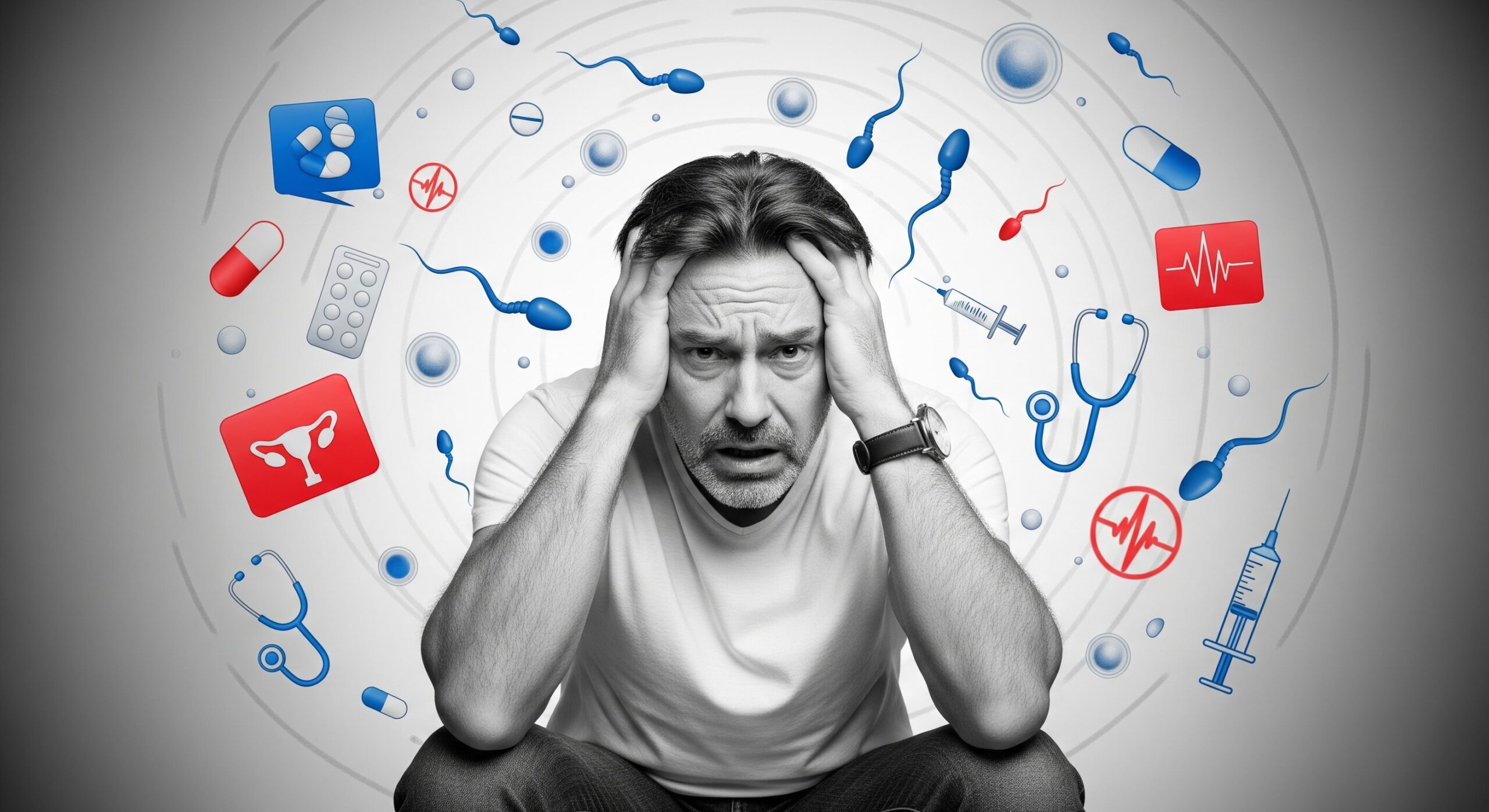Understanding the signs of unhealthy sperm is crucial for anyone concerned about fertility and reproductive health. Sperm health is a significant factor in conception, and recognizing the indicators of potential issues can lead to timely interventions. This article delves into the various signs of unhealthy sperm, underlying factors, and ways to improve sperm quality.
Signs of Unhealthy Sperm
Low Sperm Count (Oligozoospermia)
Low sperm count, or oligozoospermia, is a condition where the semen contains fewer sperm than normal. This can significantly impact fertility, making it difficult for couples to conceive. A low sperm count can be caused by various factors, including lifestyle choices, medical conditions, and environmental influences.
- Causes of Low Sperm Count:
- Smoking and excessive alcohol consumption
- Exposure to environmental toxins
- Certain medications and medical treatments
Poor Sperm Motility (Asthenozoospermia)
Poor sperm motility, known as asthenozoospermia, refers to the reduced ability of sperm to swim efficiently. This can hinder the sperm’s journey to the egg, reducing the chances of fertilization. Factors such as lifestyle habits and health conditions can contribute to poor motility.
- Factors Affecting Sperm Motility:
- Sedentary lifestyle
- Obesity
- Infections or inflammation
Abnormal Sperm Morphology
Abnormal sperm morphology involves irregularities in the size and shape of sperm. This can affect the sperm’s ability to penetrate and fertilize an egg. Morphological abnormalities can be influenced by genetic factors, health issues, and environmental exposures.
- Common Morphological Abnormalities:
- Misshapen heads
- Defective tails
- Double tails
High DNA Fragmentation
High DNA fragmentation in sperm can lead to reduced fertility and increased risk of miscarriage. This condition involves breaks in the DNA strands within the sperm, which can affect embryo development. Factors such as oxidative stress and lifestyle choices can contribute to DNA fragmentation.
- Causes of DNA Fragmentation:
- Smoking and drug use
- Advanced paternal age
- Exposure to radiation
Physical Indicators of Sperm Health Issues
Enlarged or Twisted Veins in the Scrotum
Enlarged or twisted veins in the scrotum, known as varicocele, can impact sperm production and quality. This condition can lead to increased temperature in the testicles, affecting sperm health.
- Symptoms of Varicocele:
- Swelling in the scrotum
- Pain or discomfort
- Visible or palpable enlarged veins
Discolored or Foul-Smelling Ejaculate
Discolored or foul-smelling ejaculate can be a sign of infection or other health issues affecting sperm quality. Changes in color or odor should be evaluated by a healthcare professional to determine the underlying cause.
- Possible Causes:
- Infections or sexually transmitted diseases
- Dietary factors
- Dehydration
Absence of Semen During Ejaculation
The absence of semen during ejaculation, known as aspermia, can indicate blockages or other reproductive health issues. This condition requires medical evaluation to identify the cause and appropriate treatment.
- Potential Causes of Aspermia:
- Blockages in the reproductive tract
- Hormonal imbalances
- Previous surgeries or injuries
Underlying Factors Affecting Sperm Quality
Previous Medical Issues with the Prostate
Previous medical issues with the prostate, such as infections or surgeries, can impact sperm quality. The prostate plays a crucial role in semen production, and any disruptions can affect fertility.
- Impact of Prostate Issues:
- Reduced semen volume
- Altered sperm motility
- Increased risk of infections
Low Sex Drive and Erectile Dysfunction
Low sex drive and erectile dysfunction can be indicators of underlying health issues affecting sperm quality. These conditions can be linked to hormonal imbalances, psychological factors, or lifestyle choices.
- Contributing Factors:
- Stress and anxiety
- Hormonal imbalances
- Poor lifestyle habits
Hormonal Imbalances
Hormonal imbalances can significantly affect sperm production and quality. Hormones such as testosterone play a vital role in sperm development, and any disruptions can lead to fertility issues.
- Common Hormonal Imbalances:
- Low testosterone levels
- Thyroid disorders
- Pituitary gland dysfunction
Importance of Healthy Sperm for Fertility
Impact on Conception Rates
Healthy sperm is essential for successful conception. Sperm quality directly influences the ability to fertilize an egg and achieve pregnancy. Poor sperm health can lead to reduced conception rates and increased time to pregnancy.
- Factors Influencing Conception:
- Sperm count and motility
- Sperm morphology
- DNA integrity
Role in Embryo Development
Sperm health plays a crucial role in embryo development. High-quality sperm contributes to the formation of a healthy embryo, reducing the risk of miscarriage and genetic abnormalities.
- Importance of Sperm Quality:
- Genetic contribution to the embryo
- Influence on embryo viability
- Impact on pregnancy outcomes
Factors Influencing Sperm Health
Age and Sperm Quality
Age is a significant factor influencing sperm quality. As men age, sperm count, motility, and morphology can decline, affecting fertility. Advanced paternal age is also associated with increased risk of genetic abnormalities.
- Effects of Aging on Sperm:
- Decreased sperm production
- Increased DNA fragmentation
- Reduced motility
Environmental Toxins
Exposure to environmental toxins can negatively impact sperm health. Chemicals, pollutants, and radiation can lead to DNA damage and reduced sperm quality.
- Common Environmental Toxins:
- Pesticides and herbicides
- Heavy metals
- Industrial chemicals
Lifestyle Choices
Lifestyle choices play a crucial role in sperm health. Habits such as smoking, excessive alcohol consumption, and poor diet can significantly affect sperm quality.
- Healthy Lifestyle Practices:
- Regular exercise
- Balanced diet
- Avoidance of harmful substances
Diagnosing Sperm Health Issues
Semen Analysis
Semen analysis is a standard diagnostic tool for assessing sperm health. This test evaluates sperm count, motility, morphology, and other parameters to identify potential issues.
- Parameters Assessed:
- Sperm concentration
- Motility percentage
- Morphological abnormalities
Genetic Testing
Genetic testing can identify underlying genetic factors affecting sperm quality. This can help in diagnosing conditions such as chromosomal abnormalities or genetic mutations.
- Types of Genetic Tests:
- Karyotyping
- Y chromosome microdeletion testing
- Genetic counseling
Hormone Level Assessment
Hormone level assessment is crucial for identifying hormonal imbalances affecting sperm production. This involves measuring levels of testosterone, luteinizing hormone, and follicle-stimulating hormone.
- Hormones Assessed:
- Testosterone
- Luteinizing hormone (LH)
- Follicle-stimulating hormone (FSH)
Improving Sperm Quality Naturally
Dietary Changes
Dietary changes can significantly improve sperm quality. A balanced diet rich in antioxidants, vitamins, and minerals supports healthy sperm production.
- Foods for Sperm Health:
- Fruits and vegetables
- Nuts and seeds
- Lean proteins
Exercise and Weight Management
Regular exercise and weight management are essential for maintaining healthy sperm. Physical activity improves circulation and hormone levels, supporting sperm production.
- Benefits of Exercise:
- Improved blood flow
- Hormonal balance
- Reduced stress levels
Stress Reduction Techniques
Stress reduction techniques can enhance sperm quality by reducing stress-related hormonal imbalances. Practices such as meditation, yoga, and deep breathing can be beneficial.
- Stress Reduction Practices:
- Mindfulness meditation
- Yoga and stretching
- Deep breathing exercises
Medical Interventions for Unhealthy Sperm
Hormone Therapy
Hormone therapy can address hormonal imbalances affecting sperm production. This treatment involves administering hormones to restore balance and improve sperm quality.
- Types of Hormone Therapy:
- Testosterone replacement therapy
- Gonadotropin therapy
- Anti-estrogen medications
Surgical Procedures
Surgical procedures can correct physical abnormalities affecting sperm health. This includes surgeries to repair varicocele or remove blockages in the reproductive tract.
- Common Surgical Interventions:
- Varicocele repair
- Vasectomy reversal
- Epididymal blockage removal
Assisted Reproductive Technologies
Assisted reproductive technologies (ART) can help couples with sperm health issues achieve pregnancy. Techniques such as in vitro fertilization (IVF) and intracytoplasmic sperm injection (ICSI) are commonly used.
- Types of ART:
- In vitro fertilization (IVF)
- Intracytoplasmic sperm injection (ICSI)
- Sperm retrieval techniques
Vivility’s Approach to Enhancing Sperm Health
Customized Supplement Plans
Vivility offers customized supplement plans tailored to individual needs. These supplements are designed to support sperm health by providing essential nutrients and antioxidants.
- Benefits of Customized Supplements:
- Targeted nutrient support
- Improved sperm quality
- Enhanced overall health
Lifestyle Coaching
Vivility provides lifestyle coaching to help individuals make positive changes for better sperm health. This includes guidance on diet, exercise, and stress management.
- Components of Lifestyle Coaching:
- Personalized diet plans
- Exercise recommendations
- Stress management techniques
Final Thoughts
Understanding the signs of unhealthy sperm and the factors affecting sperm quality is crucial for anyone concerned about fertility. By recognizing these signs and taking proactive steps, individuals can improve their reproductive health and increase their chances of conception. Whether through natural methods or medical interventions, addressing sperm health issues is essential for achieving successful pregnancy outcomes.
FAQs
What are the most common signs of unhealthy sperm?
The most common signs of unhealthy sperm include low sperm count, poor motility, and abnormal morphology. These issues can significantly impact fertility and the ability to conceive.
How long does it take to improve sperm quality?
Improving sperm quality can take several months, as sperm production cycles last about 74 days. Consistent lifestyle changes and medical interventions can lead to noticeable improvements over time.
Can lifestyle changes really impact sperm health?
Yes, lifestyle changes can significantly impact sperm health. Healthy habits such as a balanced diet, regular exercise, and stress management can improve sperm quality and overall reproductive health.
Are there any supplements that can boost sperm quality?
Certain supplements, such as antioxidants and vitamins, can boost sperm quality. These supplements support sperm production and protect against oxidative stress.
When should I consult a doctor about sperm health concerns?
Consult a doctor if you experience persistent fertility issues or notice signs of unhealthy sperm. Early evaluation and intervention can improve outcomes and address underlying health concerns.
What are the signs of unhealthy sperm?
Signs of unhealthy sperm include low count, poor motility, and abnormal morphology. These indicators can affect fertility and the ability to achieve pregnancy.
How can I test my sperm quality at home?
Home sperm testing kits are available to assess basic sperm parameters. However, a comprehensive evaluation by a healthcare professional is recommended for accurate diagnosis.
Can unhealthy sperm still fertilize an egg?
Unhealthy sperm can fertilize an egg, but it may lead to complications such as miscarriage or genetic abnormalities. High-quality sperm is essential for successful fertilization and embryo development.
Does frequent ejaculation affect sperm quality?
Frequent ejaculation can temporarily reduce sperm count, but it does not significantly impact overall sperm quality. Regular ejaculation is part of a healthy reproductive system.
Are there any foods that can improve sperm health?
Yes, foods rich in antioxidants, vitamins, and minerals can improve sperm health. A diet including fruits, vegetables, nuts, and lean proteins supports healthy sperm production.


